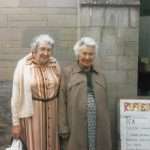The wonder of email brought a photograph of my primary school teachers this afternoon. It is hard to imagine the two ladies of advancing years had been the commanding figures of memory. It will be forty years in July since I left High Ham Church of England Voluntary Controlled Primary School where Miss Rabbage and Miss Everitt comprised the entirety of the full time staff.
Miss Everitt, I discovered for the first time today, had been there since 1947 and taught for thirty years until her retirement in 1977. Miss Rabbage retired in 1972, at the age of 60; had she been a teacher there during the war years? They were questions that an eleven year old would never have thought to ask for fear of a slap for being cheeky.
Teaching was never exciting, but it was solid and it was lasting. The daily recitation of the times tables in the infant class created a capacity that has never declined – anything up to 12 x 12 and my response is instant and automatic. We were expected to answer without needing to think. Spelling was based on textbooks called ‘Word Perfect’. There were sixteen words set from the book each Monday and a test each Friday morning. Sixteen correct out of sixteen earned a gold star; fifteen out of sixteen and the star was silver; much below twelve, and Miss Rabbage was not pleased.
Miss Everitt taught ‘nature’ – we would have to sketch sepals and petals and stamens and label them neatly. Miss Rabbage taught ancient history – there were charts on the wall telling of Sumerian civilisation; and modern history – we once had to draw slips of paper with the names of people in Victorian times about whom we were to write a project, I drew Disraeli, but being unsure of who he was, swapped with someone who had drawn Shaftesbury, they got a much more exciting subject!
There was pressure to work hard and to do well. Never having the tidiest handwriting (I reverted to printing when I was fifteen because my joined up writing was so bad), I dreaded the handwriting classes where we were given inkpens and books from which we were to copy copperplate script.
There were moments of respite: programmes to watch on the school television; BBC Schools broadcasts on the radio, particularly ‘Singing Together’; our attempts to play recorder, (‘Every Good Boy Deserves Food’ might have meant something to someone who could hear the difference between the notes E and D); art classes taught by Mr Shield, who came one afternoon a week and who had been in an RAF bomber during the war and whose passion in life was his pigeons.
Of course, if asked, there would not have been a day when I could have told anyone what I had learned, but we learned, and we learned, and we learned.
Our old Victorian school building was demolished some years ago. The present village school is new and it’s beautiful, built in fine Somerset stone. It’s a great school, one of the best in the country, and I am proud to have attended it, and I hope it upholds the best traditions of Miss Rabbage and Miss Everitt.
